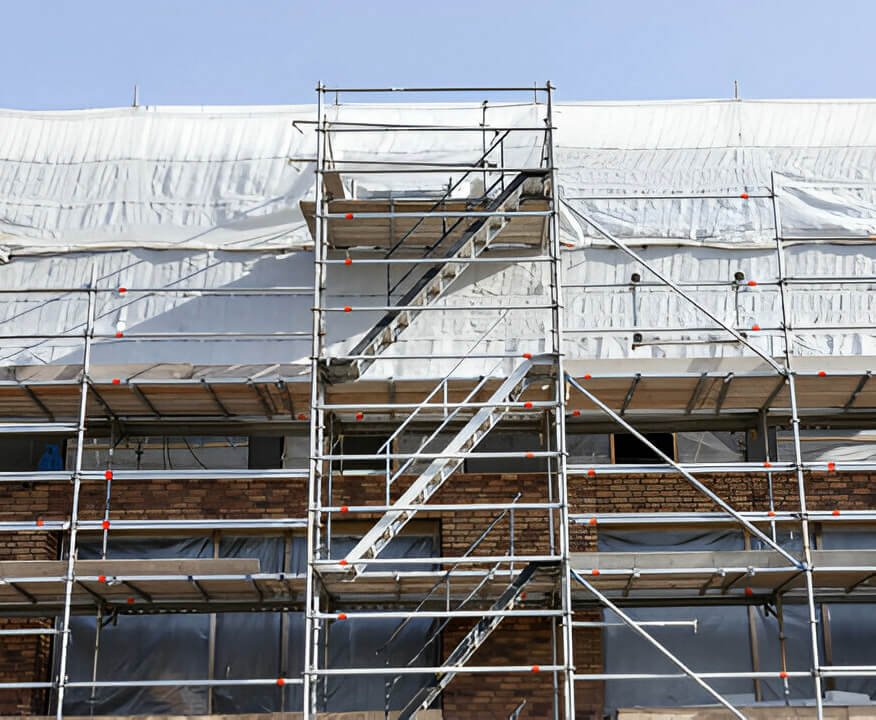Dependable Domestic Scaffolding for Homeowners in Need of Safe Renovations
Dependable Domestic Scaffolding for Homeowners in Need of Safe Renovations
Blog Article
Checking Out the Numerous Kinds of Scaffolding Used in Construction Projects
The construction industry depends greatly on numerous kinds of scaffolding to meet certain project requirements, each offering distinctive benefits and applications. Traditional framework scaffolding provides a sturdy foundation for general tasks, while suspended scaffolding is vital for service high-rise structures. Various other options, such as system and rolling scaffolding, cater to performance and mobility, specifically. Additionally, the cantilever alternative verifies very useful in urban environments where room is constrained. Recognizing the nuances of these scaffolding kinds is essential for optimizing safety and security and efficiency on construction sites, motivating a more detailed evaluation of their one-of-a-kind attributes and applications.

Standard Framework Scaffolding
Conventional frame scaffolding is just one of one of the most widely used techniques in the building and construction industry as a result of its effectiveness and flexibility. This system includes straight and upright structures that are put together to create a steady platform for products and employees. The major parts consist of upright blog posts, horizontal ledgers, and angled dental braces, which together supply a strong framework that can sustain considerable loads.
One of the essential benefits of typical framework scaffolding is its versatility to numerous construction tasks, ranging from household buildings to big commercial structures. The modular design enables very easy setting up and disassembly, making it reliable for both long-term and short-term tasks. Additionally, the system can be personalized in elevation and size, fitting different structure designs and website conditions.
Safety and security is extremely important in scaffolding applications, and standard frame systems are equipped with guardrails and toe boards to avoid drops and guarantee worker protection. Additionally, normal evaluations and adherence to safety guidelines are essential in keeping the stability of the scaffold. In general, conventional frame scaffolding remains an essential choice in the construction industry, supplying a trusted system for labor and improving overall project performance

Suspended Scaffolding
Put on hold scaffolding uses an unique remedy for construction jobs that call for access to raised surface areas, especially in circumstances where typical structure scaffolding might be not practical. This kind of scaffolding is commonly suspended from the roofing system or upper levels of a structure, making use of a system of ropes, platforms, and pulleys to produce a working area that can be adapted to different elevations.
Among the primary benefits of put on hold scaffolding is its flexibility. It can be easily repositioned or reduced to accommodate adjustments in construction requirements, making it perfect for tasks such as window setup, façade work, and upkeep on skyscrapers. Additionally, the very little impact of suspended scaffolding allows for better use of ground space in city environments, where space is commonly minimal.
Safety and security is an important factor to consider in the usage of suspended scaffolding. In general, put on hold scaffolding provides a efficient and effective service scaffolding vernacular term for accessing hard-to-reach areas in different construction situations, improving both efficiency and safety and security on site.
System Scaffolding
System scaffolding, usually concerned as a contemporary remedy in the scaffolding sector, includes pre-engineered elements that can be rapidly constructed and adjusted for different building projects. Scaffolding. This sort of scaffolding is characterized by its modular design, which permits adaptability and performance on work websites, accommodating various elevations and architectural demands
Commonly made from high-strength steel or light weight aluminum, system scaffolding provides improved sturdiness and security. The elements include upright articles, straight journals, and angled braces, which interconnect securely, making sure a durable framework. The style frequently incorporates standard fittings, streamlining setting up and disassembly procedures, therefore reducing labor time and expenses.

Rolling Scaffolding
Moving scaffolding is a functional choice to traditional set scaffolding, created for flexibility and ease of usage on construction sites. This sort of scaffolding contains a platform supported by structures with wheels, allowing workers to conveniently move it as required. The wheelchair attribute substantially improves efficiency, as it lessens downtime connected with setting up and taking apart taken care of scaffolding.
Commonly built from light-weight materials such as aluminum or steel, rolling scaffolding supplies a tough yet portable remedy for jobs requiring constant repositioning - Scaffolding. It is specifically advantageous in jobs such as painting, drywall installment, and electric work, where access to numerous heights and areas is essential
Safety and security is vital in rolling scaffolding design, with attributes such as securing wheels to protect against unexpected movement when in usage, and guardrails to safeguard workers from drops. Furthermore, many designs are adjustable in elevation, fitting various job requirements.
Cantilever Scaffolding

The layout of cantilever scaffolding typically entails using arms or braces anchored to a building or framework, enabling the system to extend external safely. Safety and security is critical; hence, these scaffolds have to be engineered to hold up against environmental conditions and numerous tons. Routine examination and upkeep are important to guarantee architectural integrity and worker security.
Cantilever scaffolding is preferred for its convenience and reliable use of room, making it a preferred option in metropolitan settings where space restrictions are usual. Moreover, it assists in simpler accessibility to high elevations, eventually contributing to the general effectiveness of construction jobs. Similar to all scaffolding types, proper training and adherence to safety and security requirements are critical for workers making use of cantilever scaffolding.
Final Thought
In verdict, the varied sorts of scaffolding used in construction tasks each offer distinct purposes tailored to details website requirements. Traditional like this frame scaffolding provides stability, while put on hold scaffolding supplies versatility for raised jobs. System scaffolding promotes quick setting up, and rolling scaffolding enhances flexibility for differing workplace. Cantilever scaffolding effectively addresses barriers in city setups. Recognizing these scaffolding kinds is vital for enhancing safety and security and efficiency in building and construction, eventually contributing to the effective completion of jobs.
Traditional framework scaffolding gives a tough foundation for basic jobs, while suspended scaffolding is important for job on skyscraper structures.Moving scaffolding is a versatile option to traditional set scaffolding, developed for wheelchair and simplicity of use on building websites. As with all scaffolding kinds, proper training and adherence to safety and security criteria are essential for workers using cantilever scaffolding.
Standard structure scaffolding provides stability, while suspended scaffolding offers convenience for raised jobs. System scaffolding promotes fast assembly, and rolling scaffolding enhances flexibility for differing work atmospheres.
Report this page